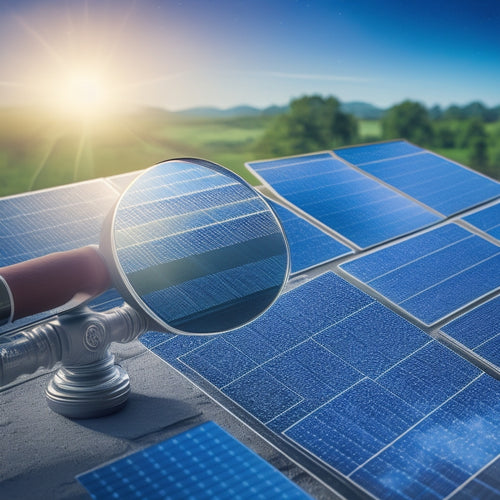
How Much Does a Solar System Cost and Installation
Share
You're looking to invest in a solar system, and you're wondering what to expect regarding costs and installation. On average, a residential solar system costs between $15,000 to $30,000, although upfront costs can be reduced through various financing options. The total cost depends on factors like labor costs, equipment quality, site assessments, local regulations, and choice of solar technology. While the initial investment may seem steep, energy savings over time can offset the installation costs, making it a smart investment for your home. As you assess your options, you'll uncover more about how to optimize your solar system's cost and performance.
Key Takeaways
- Average residential solar system costs range from $15,000 to $30,000, with financing options to reduce upfront costs.
- Installation costs vary based on factors like labor, equipment quality, site complexity, and local regulations.
- The cost of individual solar panels depends on quality and brand, ranging from $150 to over $300 per panel.
- Total system installation expenses include equipment, labor, permits, and ongoing maintenance, which averages 10-20% of the total cost.
- Federal and state incentives, such as the Solar Investment Tax Credit, can reduce the overall cost of a solar system.
Understanding Solar System Pricing
When you're considering a solar system installation, one of the biggest factors influencing your decision is likely to be the cost. As you weigh the benefits of going solar, you'll want to understand the pricing structure and how it affects your wallet.
The cost of a solar system varies depending on several factors, including the system's size, quality, and installation complexity. On average, a residential solar system can cost anywhere from $15,000 to $30,000 or more.
However, with solar financing options available, the upfront cost can be greatly reduced. In fact, many homeowners opt for financing plans that allow them to pay for their solar system over time, often with little to no money down.
Additionally, the energy savings you'll enjoy with a solar system can help offset the cost over time. With the right financing plan and energy savings, going solar can be a smart investment for your home and your wallet.
Factors Affecting Installation Cost
As you examine the world of solar system installation, pinpointing the factors that influence the cost of installation becomes vital. Several variables contribute to the overall cost, and understanding them helps you make informed decisions.
Labor costs, for instance, vary depending on the installer's experience, location, and reputation. The quality of equipment also plays a significant role, as high-efficiency panels and premium inverters come at a higher price.
A thorough site assessment is essential to determine the installation complexity, which can impact costs. Local regulations, permits, and inspections add to the expenses, while financing options, such as loans or leases, can affect your upfront costs.
The type of solar technology you choose, like monocrystalline or thin-film, also influences the cost. Additionally, the installation company's overhead, marketing, and profit margins are factored into the final quote.
Average Cost of Solar Panels
The solar panel system's sticker price often hinges on the cost of individual panels, which can vary considerably depending on their quality, efficiency, and brand reputation.
As you assess your options, you'll find that different solar panel types come with distinct price tags. For instance, high-efficiency panels from top-tier brands like SunPower or Panasonic can cost upwards of $300 per panel. On the other hand, more affordable options from Chinese manufacturers like Trina or Jinko may range from $150 to $200 per panel.
When calculating the total cost, consider that a typical residential solar system requires around 20-25 panels. This puts the overall cost of solar panels alone at $3,000 to $7,500 or more, depending on your choices.
Fortunately, financing options are available to help make solar more accessible. Many solar companies offer financing plans or partnerships with lenders that can spread the cost over several years. Be sure to factor these costs into your overall budget as you weigh the benefits of going solar.
Total System Installation Expenses
Installing a solar panel system requires more than just purchasing the panels themselves. You'll need to take into account the total system installation expenses, which include the cost of equipment, labor, and permits.
The installation process involves several stages, including site assessment, system design, and installation, which can take anywhere from a few days to several weeks, depending on the complexity of the project and the installation timeline.
In addition to the upfront costs, you should also factor in ongoing system maintenance expenses. Regular maintenance is crucial to guarantee your solar panel system operates at peak efficiency. This includes tasks such as cleaning the panels, inspecting the system for damage, and replacing components as needed.
While these costs may seem insignificant, they can add up over time. On average, you can expect to pay around 10-20% of the total system cost for installation and maintenance expenses.
This amount may vary depending on the size and complexity of your system, as well as the installation company you hire. Be sure to factor these expenses into your overall budget to get a clear overview of the total cost of owning a solar panel system.
Incentives and Rebate Options
Owning a solar panel system can be a cost-effective investment, especially when you factor in the various incentives and rebate options available. You can greatly reduce your upfront costs with federal incentives, such as the Solar Investment Tax Credit (ITC), which allows you to claim 26% of your total system cost as a tax credit.
In addition, many states offer rebates and tax credits to encourage the adoption of renewable energy. You can also investigate financing options, such as power purchase agreements (PPAs) and property-assessed clean energy (PACE) financing, which can help spread the cost of installation over time.
Moreover, some utilities offer special tariffs and rebates for solar customers. When calculating the total cost of your solar system, be sure to factor in these incentives and rebates to get a more accurate estimate.
Frequently Asked Questions
Can I Install Solar Panels on My Own to Save Money?
You're tempted to go solo, but DIY solar installation can be a formidable task, riddled with technical challenges, electrical risks, and warranty voids - are you prepared to sacrifice safety and efficiency for potential cost savings?
Do Solar Panels Require Regular Maintenance or Cleaning?
You'll need to clean your solar panels regularly to guarantee peak energy production, with maintenance frequency depending on your location and climate, as regular upkeep can extend the solar panel lifespan and maximize your power output.
How Long Does a Typical Solar System Installation Take?
You'll typically spend 3-5 days overseeing the installation process, but the actual installation timeline varies depending on your roof's complexity and the crew's experience, with most systems going live within a week or two.
Can I Finance My Solar System Through a Bank or Lender?
You can finance your solar system through a bank or lender, exploring solar loan options that offer flexible repayment terms and financing benefits, such as tax credits and lower monthly payments, to power your shift to renewable energy.
Will Solar Panels Increase My Property's Resale Value?
You'll reap benefits from your solar investment, as it greatly enhances your property's resale value, thanks to the increased energy efficiency and eco-friendly appeal, making your home more attractive to potential buyers.
Related Posts
-

Essential Accessories for Heavy Riders of E-Bikes
As a heavy rider of an e-bike, you need specialized gear that caters to your unique needs. Start with safety essentia...
-

Solar Panel System Certification Costs: A 10-Point Breakdown
You're looking to understand the costs associated with solar panel system certification. Your total certification cos...
-

5 Ways Bike Sharing Boosts Urban Sustainability
As you explore bike-sharing options, you'll discover five ways it boosts urban sustainability. By reducing congestion...


